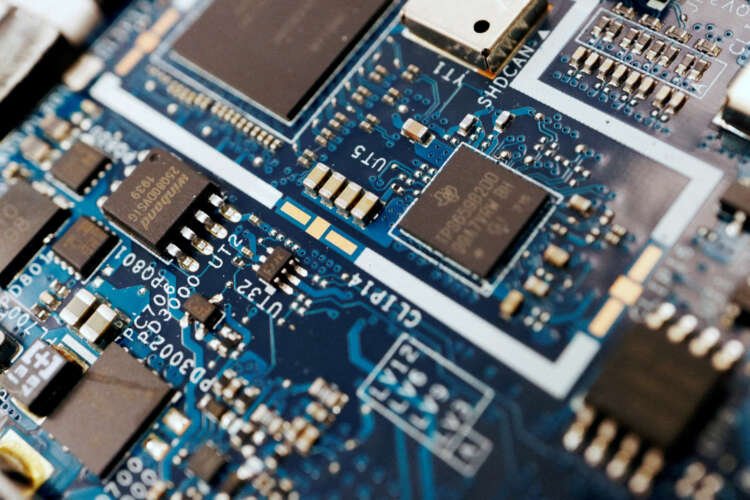Germany blocks Chinese stake in two chipmakers over security concerns


By Andreas Rinke and Miranda Murray
BERLIN (Reuters) -The German government on Wednesday blocked prospective Chinese investment in two domestic semiconductor producers after the moves raised concerns over national security and the flow of sensitive technological know-how to Beijing.
The government said it had vetoed the takeover of the chip factory of the Dortmund-based company Elmos by Silex, a Swedish company that is a subsidiary of Chinese group Sai Microelectronics.
Berlin also blocked investment in ERS Electronic, which is based in the southern state of Bavaria, government sources told Reuters. A spokesperson for ERS Electronic said there was no plans to sell the company but it had been exploring the option of getting investment from a Chinese private equity firm.
The decisions came at a time of heightened sensitivity around relations between Berlin and Beijing.
Sai Microelectronics said it “deeply regrets” the decision and will study the details to decide on any next steps.
“The company will continue to be optimistic about and attach importance to the automotive chip industry and related business,” the Shenzhen-listed chip developer and wafer maker said in a filing to the Shenzhen bourse.
The government of Chancellor Olaf Scholz, who visited China last week, is trying to balance a push for access to the Chinese market for European companies with addressing security concerns and reducing Germany’s trade reliance on China.
It has been reviewing its policy towards China especially in the wake of Russia’s invasion of Ukraine in February, which exposed Germany’s heavy dependence on Russian gas.
“We have to look at company takeovers closely, when it comes to important infrastructure or when there is a danger that technology flows to buyers from non-EU countries,” Economy Minister Robert Habeck said in a statement.
“Especially in the semiconductor sector, it is important to us to protect the technological and economic sovereignty of Germany and Europe. Of course, Germany is and will remain an open investment location, but we are not naive either.”
Elmos could not be reached for comment. A spokesperson for China’s foreign ministry said Beijing wanted a fair and open environment for Chinese investment.
CHINA DEMANDS FAIRNESS
Speaking to reporters after the decision, Habeck said China was making a “a deliberate, strategic approach to influencing both knowledge discovery and production control, particularly in the area of semiconductor and microchip manufacturing.”
Scholz earlier had pushed through a decision to allow China to buy a minority stake in a terminal in Germany’s largest port despite opposition from within his coalition.
That decision had sparked an angry response by the foreign ministry, which warned that the investment disproportionately expanded China’s strategic influence. China has previously dismissed such concerns.
Scholz has warned of any decoupling from China or de-globalisation in general, while also emphasizing the need for Germany to diversify its Asia trade and take strategic concerns more into account in its business dealings.
While saying he was not aware of the specific Elmos and ERS Electronic investments, Chinese foreign ministry spokesperson Zhao Lijian said Beijing had encouraged its companies to carry out win-win investment cooperation overseas.
“All countries, including Germany, should provide a fair, open and non-discriminatory market environment for the normal operation of Chinese enterprises and refrain from politicising normal economic and trade cooperation, not to mention protectionism on the grounds of national security,” Zhao told a regular news briefing.
(Reporting by Andreas Rinke, Miranda Murray and Christina Amann; Additional reporting by Eduardo Baptista in Beijing and Twinnie Siu in Hong Kong; Writing by Matthias Williams; Editing by Mark Heinrich and Christopher Cushing)
National security refers to the protection of a nation's borders, interests, and citizens from threats, including military attacks, terrorism, and espionage.
Foreign investment occurs when individuals or companies from one country invest in assets or businesses in another country, often to gain returns or expand market reach.
A takeover is the acquisition of one company by another, where the acquiring company gains control over the target company's assets and operations.
A subsidiary is a company that is completely or partly owned and controlled by another company, known as the parent company.
Explore more articles in the Top Stories category











